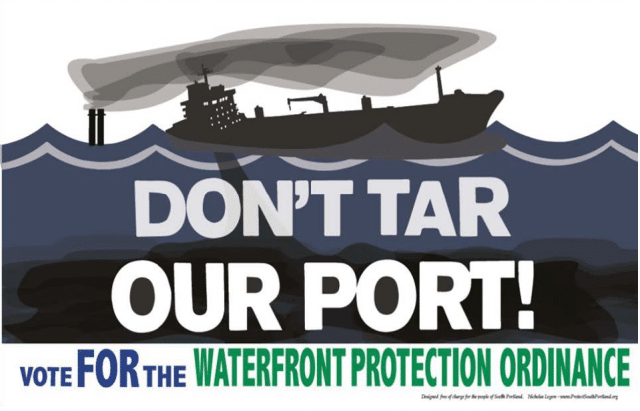Of all the elections and ballot measures voted on around the country on Tuesday, perhaps the most egregious example of the fossil fuel industry’s money influencing an outcome was seen in South Portland, Maine.
Voters in the coastal city were deciding whether to approve a ballot item that would have essentially prevented the loading of tar sands crude onto ships in the South Portland harbor.
The proposed Waterfront Protection Ordinance, which appeared on the ballot after the Protect South Portland citizens group gathered enough signatures this past Spring, was voted down by less than 200 votes, out of 8,714 total votes cast.
In the months leading up to the vote, local residents were bombarded with media and direct mail campaigns opposing the ordinance. The week before the election, campaign finance reports revealed that the oil industry had pumped over $600,000 into ads and mailings opposing the measure.
The Save Our Working Waterfront campaign received most of its funding from big oil companies and industry groups like Citgo, Irving, and the American Petroleum Institute. A good chunk of the money raised – $123,427 to be exact – was used to hire the Maryland-based consultancy DDC Advocacy, which advertises its ability to organize online campaigns and “local grassroots” advocacy.
Contrast that $600,000 with the roughly $100,000 raised by the three local groups, including Protect South Portland, to support the ordinance.
According to Crystal Goodrich, who organized the door-to-door campaign efforts for Protect South Portland, the oil industry spent more per voter – about $32 per voter in this town of just 19,000 voters – than in even the most expensive elections across the country. “The oil industry bought this election at more than $135 per vote,” said Goodrich, calculating the cost for each “no” vote.
Why would the oil industry fight so hard against the ordinance in this one small coastal town? As we’ve reported previously here on DeSmogBlog, the operators of the Portland-Montreal Pipeline have a not so secret plan to reverse the flow of their line to funnel tar sands crude from the terminus of the Enbridge Line 9, which is currently being reversed in piecemeal fashion, to the South Portland terminal.
There, tar sands crude could be loaded onto tankers for shipment to refineries on the Gulf Coast and abroad. The 70-year old, 236-mile long Portland-Montreal Pipeline currently carries imported crude to Canadian refineries. While operators of the Portland-Montreal Pipeline maintain that there are no immediate plans to ask for a reversal, internal documents and company actions indicate otherwise.
A 2012 report, Going in Reverse: The Tar Sands Threat to Central Canada and New England, by 19 advocacy groups including the Natural Resources Defense Council, Conservation Law Foundation, Greenpeace Canada, the National Wildlife Federation, and 350.org, explains:
The Portland-Montreal Pipe Line is managed by two linked companies: the Montreal Pipe Line Limited, which owns and operates the Portland-Montreal Pipe Line with its wholly owned U.S. subsidiary, the Portland Pipeline Corporation.
The Portland-Montreal Pipe Line company, as well as Enbridge Inc., have been open about their intent to move tar sands oil east through central Canada and New England. In 2011, Portland Pipe Line Corp. expressed publicly, “We’re still very much interested in reversing the flow of one of our two pipe lines to move western Canadian crude to the eastern seaboard,” treasurer Dave Cyr was reported saying. “We’re having discussions with Enbridge on their Line 9 and what it means to us.”
The Portland Pipe Line Corporation applied four years ago for a permit to use South Portland as the potential location for an alternate tar sands pipeline. Montreal Pipe Line Limited has also applied for a permit to build a pumping station along its right-of-way in Quebec, which would allow for the oil flow to be reversed on the Portland-Montreal link. In February 2012, however, a Quebec judge denied the permit.
It should also be noted that Montreal Pipe Line Limited is owned in large part by Imperial Oil Limited and Suncor Energy. Both companies have major stakes in tar sands mining and refining operations in Alberta.
Despite the ballot defeat, opponents of tar sands in South Portland are optimistic about their campaign going forward. Carolyn Graney, a South Portland resident and volunteer with the Protect South Portland campaign, told the Bangor Daily News that, “though she was disappointed with the result, the issue was not settled.”
“I’m still feeling the excitement and momentum we have in South Portland around this issue,” said Graney. “So I’m confident we’re not going to allow tar sands into our city no matter what.”
Cathy Chapman, a spokesperson for Protect South Portland, echoed this sentiment.
“We successfully came together with our neighbors to protect our community and that’s not going away,” said Chapman. “We’re more committed than ever to keeping tar sands out of South Portland. We’re going to vigilantly watch the Portland Pipe Line Corporation, while reviewing our legal and political options. We will hold the Portland Pipe Line Corporation to its claims that it doesn’t have plans to pump tar sands through Maine.”
Subscribe to our newsletter
Stay up to date with DeSmog news and alerts







